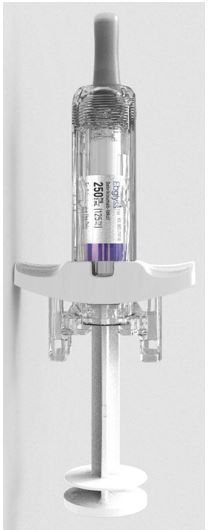- Clinical Technology
- Adult Immunization
- Hepatology
- Pediatric Immunization
- Screening
- Psychiatry
- Allergy
- Women's Health
- Cardiology
- Pediatrics
- Dermatology
- Endocrinology
- Pain Management
- Gastroenterology
- Infectious Disease
- Obesity Medicine
- Rheumatology
- Nephrology
- Neurology
- Pulmonology
Lilly Announces FDA Approval of Lebrikizumab-lbkz for Moderate to Severe Atopic Dermatitis
Among those treated with lebrikizumab, more than one-third saw clear/almost clear skin at week 16; three-quarters of them maintained results at week 52 with monthly dosing.
The FDA on September 13 approved lebrikizumab-lbkz (Ebglyss) for adults and children aged 12 years and older with moderate to severe atopic dermatitis (AD) not controlled by topical therapies, according to an announcement from Eli Lilly and Company.
The IL-13 inhibitor is indicated for treatment of adults and of pediatric patients who weigh at least 88 pounds (40 kg) and can be used with or without topical corticosteroids, the company said.
Courtesy of Lilly

The approval is supported by positive data from the ADvocate 1 and ADvocate 2 phase 3 clinical trials that evaluated lebrikizumab as monotherapy in adults and children aged 12 years and older and the ADhere phase 3 study that assessed the efficacy and safety of the biologic in the same populations but used in combination with topical steroids.
"Patients still struggle to control their moderate-to-severe atopic dermatitis with currently available therapies. Many experience poor long-term disease control, and severe itch can significantly impact their daily lives," Jonathan Silverberg, MD, PhD, MPH, professor of dermatology at George Washington University School of Medicine and Health Sciences in Washington, DC, said in the Lilly announcement.
More than 1000 adults and children aged 12 years and were enrolled across the 3 studies. Participants had moderate-to-severe AD uncontrolled by topical prescription medications and the primary endpoint for the trial trio was assessed at 16 weeks and measured clear or almost clear skin.
Clear skin, itch relief
When data from ADvocate 1 and ADvocate 2 were averaged, 38% of the participants who received the lebrikizumab 250 mg/2 mL injection achieved clear or almost clear skin at 16 weeks, compared to 12% who received placebo treatment. Further, according to the Lilly statement, 10% saw the results as early as 4 weeks. Of those whose skin was evaluated as clear or almost clear after 16 weeks, results were maintained for 77% at one year with monthly maintenance doses. Notably, almost half (48%) of those with good response who were switched to placebo after 16 weeks also maintained results at 52 weeks.
Findings for itch relief also favored lebrikizumab with 43% of lebrikizumab-treated participants experiencing relief at 16 weeks, versus 12% with placebo, with 5% feeling relief as early as 2 weeks. Among those with itch relief at week 16, 85% continued to feel relief after a year on monthly maintenance treatment, and 66% maintained relief at the 52-week mark after switching to placebo.
"Today's approval allows people the opportunity to reimagine life with eczema as [lebrikizumab] offers a targeted approach to reduce a main cause of eczema inflammation. [Lebrikizumab] provides long-lasting symptom relief with a convenient once-monthly maintenance dose," Daniel Skovronsky, MD, PhD, chief scientific officer and president of Lilly Research Laboratories, and president, Lilly Immunology, said in the press release.
Among the nearly 16.5 million adults in the US who have eczema, approximately 6.6 million endure moderate to severe symptoms including itchiness, dry, scaly skin, discoloration and rashes, symptoms that trigger scratching and may even lead to bleeding, Kristin Belleson, president, and CEO of the National Eczema Association observed. The condition does not discriminate in who it affects and is seen across people with all skin tones, of all ethnicities, and across genders and ages. "The approval of [lebrikizumab] provides hope and promise for the eczema community and those still seeking lasting relief from disruptive symptoms."
lebrikizumab 250 mg/2 mL injection is dosed as a single monthly maintenance injection following the initial treatment phase. The recommended initial starting dose is 500 mg, ie, a 250 mg injection at week 0 and week 2, followed by 250 mg every 2 weeks until Week 16 or later when adequate clinical response is achieved; after this, maintenance dosing is a single monthly injection (250 mg every 4 weeks).
Lebrikizumab was approved by the European Commission in 2023, Japan in January 2024, and Canada in June 2024.
Lilly anticipates the drug will become available in the US in a matter of weeks.
